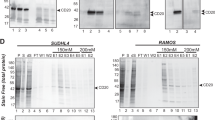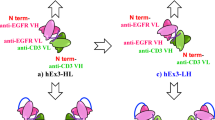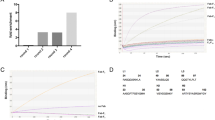Abstract
It is well established that bispecific antibodies (BsAbs) can be used effectively in targeting the ribosome-inactivating protein (RIP), saporin, against neoplastic B cells. We have now extended this delivery system for use with gelonin. By measuring antigen-binding characteristics and epitope mapping a panel of anti-gelonin MAbs using the IAsys resonant mirror bisensor, we were able to rapidly select the most suitable for making BaAbs. The Fab' fragments from these MAbs were chemically conjugated with Fab' from either anti-CD22 or anti-CD38. Cytotoxicity assays showed that BsAbs were highly efficient at delivering gelonin to cultured Daudi cells and achieved levels of toxicity which correlated closely with the affinity of the BsAbs. Using pairs of anti-CD22 BsAbs we were able to generate bivalent BsAb-gelonin complexes which achieved IC50 values of 2 x 10(-11) M gelonin, a potency which is equivalent to that reached by saporin in this targeting system. However, because gelonin is 5-10 times less toxic than saporin, the therapeutic ratio for gelonin is superior, making it potentially a more useful agent for human treatment. Cytotoxicity assays and kinetic analysis showed that targeting gelonin via CD38 was 2-5 times less effective than delivery through CD22. However, with a pair of BsAbs designed to co-target gelonin via CD22 and CD38, the cytotoxicity achieved equalled that obtained with a pair of anti-CD22 BsAbs (IC50 = 1 x 10(-11) M). This important result suggests that the anti-CD38 helps bind the gelonin to the cell and is then 'dragged' or 'piggy-backed' into the cell by the anti-CD22 BsAb. The implication of these findings for cancer therapy is discussed.
This is a preview of subscription content, access via your institution
Access options
Subscribe to this journal
Receive 24 print issues and online access
$259.00 per year
only $10.79 per issue
Buy this article
- Purchase on Springer Link
- Instant access to full article PDF
Prices may be subject to local taxes which are calculated during checkout
Similar content being viewed by others
Author information
Authors and Affiliations
Rights and permissions
About this article
Cite this article
French, R., Penney, C., Browning, A. et al. Delivery of the ribosome-inactivating protein, gelonin, to lymphoma cells via CD22 and CD38 using bispecific antibodies. Br J Cancer 71, 986–994 (1995). https://doi.org/10.1038/bjc.1995.190
Issue Date:
DOI: https://doi.org/10.1038/bjc.1995.190
This article is cited by
-
Targeting of a developmentally regulated epitope of CD43 for the treatment of acute leukemia
Cancer Immunology, Immunotherapy (2011)



